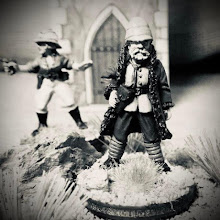The English Civil War has caught my interest again especially with the advent of hard plastic miniatures in 28mm. This is the not the first time that I have collected armies for this period, but it is the first time that I have seriously dedicated myself to game the wars of Fairfax, Cromwell, Rupert and Leslie in 28mm. So how does an American get excited about gaming the English Civil War (wars, actually)?
Because it's cool.
Pike Block for Samuel Jones' Regiment of foot. Figures are Warlord Games plastics except the office of pike which is Wargames Foundry.
Images of heroic cavalry charges, steady blocks of infantry, gallant last stands - and men were not ashamed to wear lace. Yep.
Another reason is the fascinating transitional period in the evolution of the Western way of war. Up to this point, the majority of battles were won by shock action; now we start to see a revolution in military affairs as battles will be decided by firepower culminating with the invention of the bayonet in the late 17th century. In his fascinating study The Iraq War: A Military History Robert Scales states (italics are mine):
" . . . the most important reason for the Coalition's victory (in Iraq) lies in the secret of Western military effectiveness first discovered by the Romans and then rediscovered by the Europeans in the 16th century: the disciplining of young men in combat formations characterized by cohesion, interdependency and trust in one another and in commanding officers. The result is a military unit that is obedient and responsive not only to its commanders but to civil authorities as well. Of all of the revolutions that have taken place in Western warfare, this was undoubtedly the most important, for on those disciplined formations - discipline in both a military and military sense - the Western state was created. In that sense, the ground formations that drove through ill-disciplined armed mobs of Iraqis were the direct lineal descendents of Roman legionnaires and the pikemen and musketeers of Gustavus Adolphus's armies."
Okay, Gustavus Adolphus was not in the English Civil Wars but he is close enough and many Englishmen, Scots and Irishmen served in his and Imperial armies. Another characterization of this period is the gradual reemergence of the Infantry as the decisive branch for winning battles with a battleline based on firepower. With dynamic social and moral changes of the period coupled with the emergence of semi-professional armies a revolution in military affairs (RMA) emerges with the introduction of linear warfare. In the pike and shot armies of the English Civil Wars I can see the obedience, loyalty, use of chain of command, the service to state and drill that allows this to happen.
Plus most of the source material is in English! (When I was a lieutenant stationed at Fort Lewis, WA, our battalion executive officer was an officer from the British army. On his desk was a sign that said, "English Spoken, American understood.")
Enough of the history lesson. This is a period that is ideal for gaming in 28 mm as it does not require huge armies. For most battles or fictional scenarios you only need 2 - 4 infantry units, a few squadrons of cavalry, an artillery gun here or there and maybe a few specialists.
Speaking of specialists.
While I am finishing Samuel Jones' Regiment of Foot, I am also painting the Marksman figure from Warlord games.
I love the detail.
I use a pumice stone and acrylic resin available from the Warstore. A small screwdriver is handy in applying. I let it dry overnight before priming.
Hey you! Why are you sitting in that white mush!
So . . . are you for King and Country or Parliament and King!
Next up: Rules, Rules, Rules - and an update on our sniper and Jones' Regiment.










Lovely painted figures. Will be looking to following your progress.
ReplyDeleteRegards,
Matt